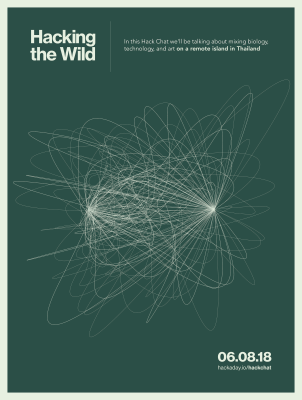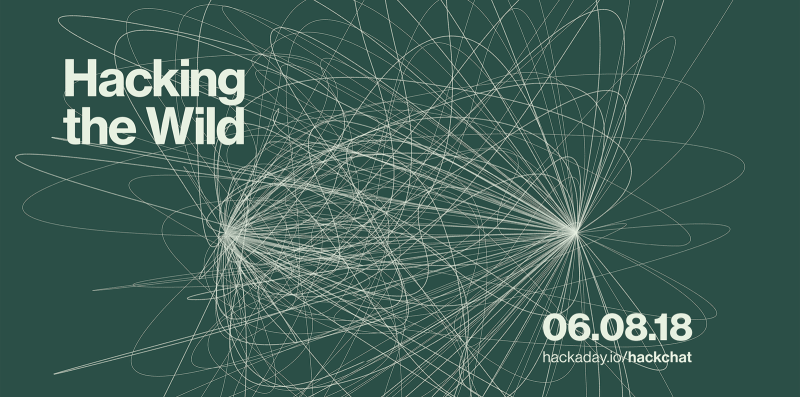It’s nearly summer, and that means we’re right at the start of conference season, at least for the tech and netsec crowd. Conferences, if you’re not aware, are a conspiracy for the hotel-industrial complex and a terrible way to spend thousands of dollars on a crappy hotel room and twenty-five dollar hamburgers.
 [Andrew Quitmeyer] is working on an experimental academic conference that might just put an end to the horrors of conference season. He’s creating his own conference called Dinacon, and it’s going to be cheaper to attend, even though it’s on a tropical island in the Pacific.
[Andrew Quitmeyer] is working on an experimental academic conference that might just put an end to the horrors of conference season. He’s creating his own conference called Dinacon, and it’s going to be cheaper to attend, even though it’s on a tropical island in the Pacific.
For this week’s Hack Chat, we’re going to be talking with [Andrew] about Dinacon, a free, two-month-long conference with over 140 attendees from every continent except Antarctica. [Andrew]’s research is in ‘digital naturalism’ at the National University of Singapore and blends biological fieldwork with DIY crafting. The focus of this conference will be workshops where participants build technology in the wild meant to interact with nature.
Not only is the intersection of DIY electronics interesting to the Hackaday community, this is also an interesting conference from a logistical standpoint. The conference philosophy spells it out pretty clearly, with the main takeaway being that [Andrew] is self-funding this conference himself. It’s only going to take about $10,000 USD to host this conference (!), and there are even a few travel stipends to go around. This is also a two-month-long conference. I assure you, after dealing with Supercons, Hackaday meetups, and all the other events Hackaday puts on, this is exceptionally interesting. It’s unheard of, even.
For this week’s Hack Chat, we’re going to be discussing:
- What is digital Naturalism?
- What does DIY electronics look like in the forest?
- What did you learn from Hacking The Wild?
- What kind of things do people make at Dinacon?
- What is the biggest bug that ever got into one of your electronics experiments?
You are, of course, encouraged to add your own questions to the discussion. You can do that by leaving a comment on the Hack Chat Event Page and we’ll put that in the queue for the Hack Chat discussion.
Our Hack Chats are live community events on the Hackaday.io Hack Chat group messaging. This week is just like any other, and we’ll be gathering ’round our video terminals at noon, Pacific, on Friday, June 8th. Here’s a clock counting down the time until the Hack Chat starts.
Click that speech bubble to the right, and you’ll be taken directly to the Hack Chat group on Hackaday.io.
You don’t have to wait until Friday; join whenever you want and you can see what the community is talking about.

















“Conferences, if you’re not aware, are a conspiracy for the hotel-industrial complex and a terrible way to spend thousands of dollars on a crappy hotel room and twenty-five dollar hamburgers.”
That could be changed by having a conference on a college campus in the off season, use dorm rooms and the cafeteria (as well as auditorium/gymnasium for speakers). I’m sure some colleges would appreciate the extra income during the slow months. Everything within walking distance!
Tele-conferencing.
But then you don’t get to stay up late drinking beer with other attendees hacking your badges!
B^)
I can’t tell if this is an unpopular solution despite the conference being about netsec or because of it.
Is this Hack Chat about hacking the Wild?
https://www.nhl.com/wild
B^)
1. Generally concur with the writer’s assessment on STEM conferences. These conferences tend to be both scammy and spammy. But the hospitality industry is simply supplying the demand for venues. Many of the IEEE conferences in North America and Europe have become almost worthless. Much free engineering time, and the IEEE still charges non-members for the papers. The shining example of well-done tech conferences are most the the stuff done by the IEEE EMC and PSES societies. They have, for over 10 years, striven to keep registration costs under 1000 USD. But they still sell the papers they got for free.
2. “Digital Naturalism investigates the role that Digital Media can play for Biological Field Work. It looks to uphold the naturalistic values of wilderness exploration, while investigating the new abilities offered by digital technology.” Have no clue what is being said. Ok, admit that my degrees have nothing to do with the life sciences, but can still read English.
3. The embraces my belief in the fundamental imperial edict that (a) the life sciences need engineers, and (b) engineers need the life sciences.
4. Hail Kahless the Unforgettable.
“If you had to identify, in one word, the reason why the human race has not achieved, and never will achieve, its full potential, that word would be ‘meetings’. ” –Dave Barry
I should get an illuminated copy of that on vellum, and placed in an expensive frame!
“…Conferences, if you’re not aware, are a conspiracy for the hotel-industrial complex and a terrible way to spend thousands of dollars on a crappy hotel room and twenty-five dollar hamburgers…”.
Conferences are not a conspiracy by, nor of, the hotel-industrial complex, but of the conference organizers who, by the way, get a substantial ‘cut’ of all that money you spend on crappy rooms and $25 hamburgers. If this were not true, then conferences would be held thusly, as they used to be, before it occurred to “the organizers” that you could be scammed: “…That could be changed by having a conference on a college campus in the off season, use dorm rooms and the cafeteria (as well as auditorium/gymnasium for speakers). I’m sure some colleges would appreciate the extra income during the slow months. Everything within walking distance!.
Another “dead-on” comment–
“… These conferences tend to be both scammy and spammy. But the hospitality industry is simply supplying the demand for venues. Many of the IEEE conferences in North America and Europe have become almost worthless. Much free engineering time, and the IEEE still charges non-members for the papers….”
Vote with your feet…and your wallet.